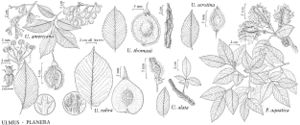Difference between revisions of "Ulmus serotina"
Bot. Gaz. 27: 92. 1899.
FNA>Volume Importer |
imported>Volume Importer |
||
| (6 intermediate revisions by 2 users not shown) | |||
| Line 13: | Line 13: | ||
}}{{Treatment/ID/Special_status | }}{{Treatment/ID/Special_status | ||
|code=F | |code=F | ||
| − | |label= | + | |label=Illustrated |
}} | }} | ||
|basionyms= | |basionyms= | ||
| Line 31: | Line 31: | ||
|elevation=0-400 m | |elevation=0-400 m | ||
|distribution=Ala.;Ark.;Ga.;Ill.;Miss.;Okla.;Tenn.;Tex. | |distribution=Ala.;Ark.;Ga.;Ill.;Miss.;Okla.;Tenn.;Tex. | ||
| − | |discussion=<p>Ulmus serotina is infrequent, and few populations are found outside of Tennessee. It reputedly is highly susceptible to Dutch elm disease (W. H. Duncan and M. B. Duncan 1988), and it is sometimes cultivated. Ulmus serotina hybridizes with U. crassifolia, and plants have been informally designated U. arkansana, an unpublished name. In Arkansas and Oklahoma where hybrid swarms are common, specimens are often difficult to assign to either taxon.</p> | + | |discussion=<p><i>Ulmus serotina</i> is infrequent, and few populations are found outside of Tennessee. It reputedly is highly susceptible to Dutch elm disease (W. H. Duncan and M. B. Duncan 1988), and it is sometimes cultivated. <i>Ulmus serotina</i> hybridizes with <i>U. crassifolia</i>, and plants have been informally designated U. arkansana, an unpublished name. In Arkansas and Oklahoma where hybrid swarms are common, specimens are often difficult to assign to either taxon.</p> |
|tables= | |tables= | ||
|references={{Treatment/Reference | |references={{Treatment/Reference | ||
| Line 43: | Line 43: | ||
-->{{#Taxon: | -->{{#Taxon: | ||
name=Ulmus serotina | name=Ulmus serotina | ||
| − | |||
|authority=Sargent | |authority=Sargent | ||
|rank=species | |rank=species | ||
| Line 57: | Line 56: | ||
|publication title=Bot. Gaz. | |publication title=Bot. Gaz. | ||
|publication year=1899 | |publication year=1899 | ||
| − | |special status=Endemic; | + | |special status=Endemic;Illustrated |
| − | |source xml=https:// | + | |source xml=https://bitbucket.org/aafc-mbb/fna-data-curation/src/2e0870ddd59836b60bcf96646a41e87ea5a5943a/coarse_grained_fna_xml/V3/V3_1111.xml |
|genus=Ulmus | |genus=Ulmus | ||
|species=Ulmus serotina | |species=Ulmus serotina | ||
Latest revision as of 21:46, 5 November 2020
Trees, to 21 m; crowns spreading, broadly rounded. Bark light brown to reddish with shallow fissures. Wood hard. Branches spreading to pendulous, often developing irregular corky wings with maturity; twigs brown to gray, pubescent to glabrous. Buds brown, apex acute, glabrous; scales dark brown, glabrous. Leaves: petiole ca. 6 mm, glabrous to pubescent. Leaf blade oblong-obovate, 7-10 × 3-4.5 cm, base oblique, margins doubly serrate, apex acuminate; surfaces abaxially yellow-gold soft-pubescent, pubescence absent from axils of veins, adaxially yellow-green, glabrous. Inflorescences racemes, 8-12-flowered, long, to 5 cm; pedicel 0.5-1 cm. Flowers: calyx lobed almost to base, lobes 5-6; stamens 5-6; anthers yellow-red; stigmas white, pubescent. Samaras light brown, ovoid to elliptic, 1-1.5 cm, narrowly winged, pubescent, margins densely ciliate, tip deeply notched. Seeds thickened, not inflated. 2n = 28.
Phenology: Flowering late summer–fall.
Habitat: Limestone bluffs, stream sides, rich woods
Elevation: 0-400 m
Distribution

Ala., Ark., Ga., Ill., Miss., Okla., Tenn., Tex.
Discussion
Ulmus serotina is infrequent, and few populations are found outside of Tennessee. It reputedly is highly susceptible to Dutch elm disease (W. H. Duncan and M. B. Duncan 1988), and it is sometimes cultivated. Ulmus serotina hybridizes with U. crassifolia, and plants have been informally designated U. arkansana, an unpublished name. In Arkansas and Oklahoma where hybrid swarms are common, specimens are often difficult to assign to either taxon.
